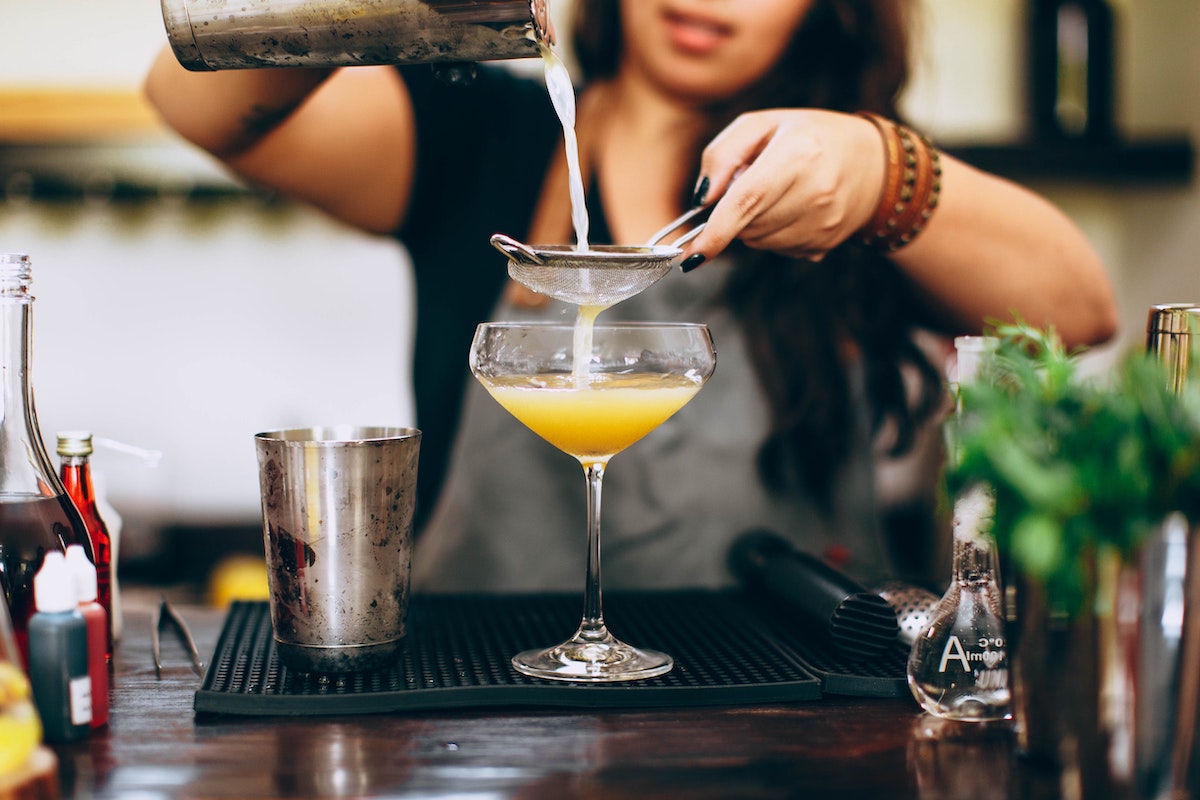
“F” James Bond… I want my martini stirred!
Harry Craddock’s Savoy Cocktail Book recommends shaking for all its martini recipes (who the fuck is Harry Craddock anyway and why should I care what he thinks?). Shaking a drink introduces air bubbles into the mixture and can chip off small pieces from the ice cubes when they hit each other or the wall of the shaker. Both factors lead to a cloudy appearance and a different texture compared with a stirred drink.
Both shaking and stirring a drink will chill and dilute the drink. Both techniques are equally effective but shaking is much faster. For this reason, some bartenders do not stir long enough to reach the matching temperature and dilution..
What types of cocktails should be shaken?
A shaken cocktail gives your drink a more ice-cold temperature than what is attainable by stirring in a mixing glass. Some shaken drinks involving soda should only be shaken before the carbonated beverage is added. Cocktails that should be shaken are ones that contain dairy, cream liqueurs, fruit juices, eggs, or sour mix. These drinks get a better balance of flavor and alcohol when there is more diluting involved.
- Margarita: Margaritas use fresh lime juice, along with tequila and triple sec, which means these cocktails should always be shaken for proper mixing, whether you’re making it frosted or on the rocks.
- Cosmopolitan: A Cosmopolitan is a classic shaken cocktail, giving the cranberry juice and lime juice a good mix of flavor.
- Daiquiri: Daiquiris always contain some version of fruit or citrus juice and will always have to be shaken in order to achieve the right texture and blend of flavors. We have recipes for the classic Daiquiri, the Strawberry Daiquiri, and the Hemingway Daiquiri.
- Aviation: With crème de violette and fresh lemon juice as staple ingredients, the Aviation cocktail must be shaken in order to include the right amount of air bubbles necessary to give it its soft, cloudy appearance. Learn how to make an Aviation cocktail here.
- Painkiller: Coconut cream, pineapple juice, and orange juice as ingredients mean this Caribbean drink must be shaken to achieve the right texture and blend.
- Gin Fizz: This cocktail contains egg whites, cream, lemon juice, and lime juice, so shaking is essential (and laborious) in order to get the whites to froth properly. Learn how to get the perfect, frothy head in our Ramos Gin Fizz recipe here.
How to shake a cocktail
When shaking a cocktail, be sure to keep a firm grip on your cocktail shaker. According to Harry Craddock, the ideology behind a good hard shake is that you want to “wake a cocktail up, not rock it to sleep”. You should treat your ice cubes like a single mass that you volley back and forth from one end of the shaker to the other. That’s why cold, quality ice matters; wet, brittle ice will slosh around and counteract what the shaker allows you to do. When shaking with fresh ice, you’ll be able to tell when your cocktail is ready by paying close attention to how the ice changes. You’ll hear it break apart and feel its mass decrease. Different drink recipes may require different shake times, however, a 10-second over-the-shoulder shake is a general rule in bartending.
What types of cocktails should be stirred?
Stirring cocktails combines flavors in a less aggressive way than shaking. When you make a stirred drink, you minimize the amount of dilution that occurs, allowing for less ice water to mix in with your ingredients and better balance the concentration of spirits. Cocktails that should be stirred are ones that are composed fully of spirits, tonics, bitters, or drinks that are built in the cocktail glass they’ll be served in.
- Corpse Reviver: This cocktail, consisting only of Cognac, brandy, and vermouth, should always be stirred. Check out our recipes for both the Corpse Reviver #1 and Corpse Reviver #2.
- Rob Roy: With whiskey, vermouth, and bitters as its main ingredients, Rob Roys are drinks that should never be shaken.
- Godmother: Vodka and amaretto liqueur are the only two ingredients involved in this cocktail recipe, and they should always be stirred.
- Negroni: With sweet vermouth, Campari, and gin, this is a simple cocktail that should be stirred.
- Manhattan: While some prefer to shake this cocktail, shaking a Manhattan can turn it cloudy and ruin the aesthetic. A Manhattan should be a stirred drink, as it contains only whiskey, vermouth, and bitters.
How to stir a cocktail
Stirred cocktails require a somewhat gentle technique and the right momentum. Many classic cocktails require stirring, and a long-handled bar spoon is the best tool to use, though in a pinch a chopstick or barbecue skewer can work as well.
To stir a drink properly, swirl steadily in a circular motion (not side to side) to prevent excess dilution, splashing, or spillage. Using your fingers rather than your wrist will also help keep the flow delicate. The length of time depends on the drink, with some drinks requiring 20 seconds of stirring while others need at least 45. Don’t over-stir your cocktail as it will cause the ice to melt, defeating the purpose of your stir to begin with.
